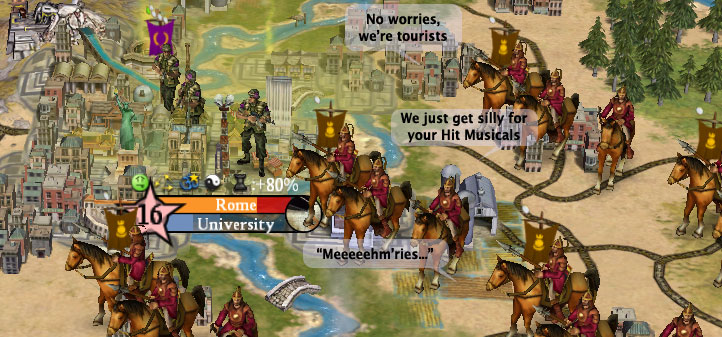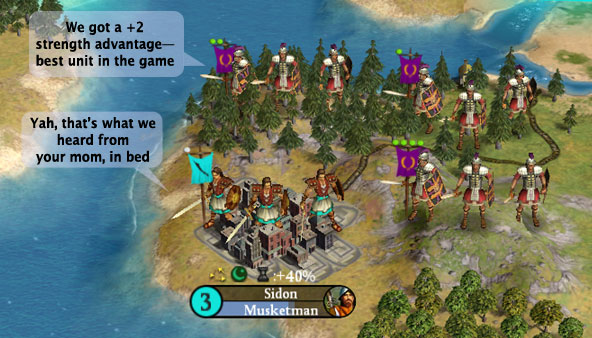
In my recent reader survey I asked if anyone had any tips for beating Civ4 at Prince; the consensus answer was "No idea; if you figure it out, tell us." I've now beaten Prince, so it's a good time to share what I know. For higher levels, you're on your own.
 First off, let me just spend some time admiring the game design. The Civ3 designers seemed to chiefly hope to undermine the best Civ2 strategies. Civ4 does this as well to some extent; but the larger goal was obviously to make the game more fun— and it works. Thus, unit wrangling is much improved; tedious things like pollution and civil turmoil are eliminated; the AIs don't seem quite so reflexly hostile; resources are more fairly distributed; faraway colonies are no longer production-poor. And the new additions— unit promotions, religions, civics, worker actions, a looser tech tree— all seem to open the game out, without introducing negatives.
First off, let me just spend some time admiring the game design. The Civ3 designers seemed to chiefly hope to undermine the best Civ2 strategies. Civ4 does this as well to some extent; but the larger goal was obviously to make the game more fun— and it works. Thus, unit wrangling is much improved; tedious things like pollution and civil turmoil are eliminated; the AIs don't seem quite so reflexly hostile; resources are more fairly distributed; faraway colonies are no longer production-poor. And the new additions— unit promotions, religions, civics, worker actions, a looser tech tree— all seem to open the game out, without introducing negatives.
The user interface is excellent; it's simply amazing how much information is available on the screen. I'm not that fond of mouseovers, but they really work here: if something isn't displayed directly, it's often visible by highlighting the obvious spot on the screen.
Worth special attention: the depiction of combat odds, as you prepare a unit move but don't release the mouse. Read it carefully, as the game is trying here to teach you how to win. If you played Civ3, your knowledge of the units generally doesn't carry over; the combat display tells you what you need to know, at the moment you need to know it.
It's also great to see exactly why a civ likes you or hates you, and even what your score is composed of.
Make sure you have the 1.52 patch or higher, since it greatly improves the Advisors— in the released version they looked like rush jobs.
That's if you go for religion at all. I usually do, because you can spread your state religion to your rivals and spy on them— exceedingly useful through most of the game. Plus you can use Organized Religion— and I don't fall in love easily, but I love this civic, which lets you build buildings 25% faster. And the religion's special building gives you money for each city with the religion, which can be a tasty bit of income.
All that said, going down the religion path is a choice, and you don't have to take it. The religions will come to you eventually. And a heavy investment in religion could slow your acquisition of other essential early techs.
Here's the main point: Cities cost income. As a rough rule of thumb, founding (or conquering!) a city will cost you 5 gp a turn. The root cause of the liquidity trap is expanding too quickly. Things you can do:
Build enough courthouses (6) so you can build the Forbidden Palace, which reduces maintenance as your capital does.
 If you get a little behind in tech, it can pay to research the most advanced tech you can: there's a chance the other civs won't have it and will trade you one or more lesser techs for it. That can catch you up quite a bit.
If you get a little behind in tech, it can pay to research the most advanced tech you can: there's a chance the other civs won't have it and will trade you one or more lesser techs for it. That can catch you up quite a bit.
As noted, the religious path means choosing Mysticism first, then either Meditation or Polytheism.
You want all the basic techs in the first column of the tech tree; but don't worry about getting them first; other civs will trade you any that you missed. Pretty early, though, you'll want The Wheel for roads and Pottery for cottages.
You need Writing then Priesthood for the Oracle Slingshot: build the Oracle and choose Code of Laws as your free tech.
Bronze Working gives you Axemen, which are good early defenders, and it opens the door to Iron Working, which allows you to work out your aggression issues via Swordsmen.
You want Alphabet for tech trading, Currency for more money, and Construction for Catapults.
The next military step is Metal Casting + Machinery + Civil Service for Macemen (strength 8). The gateway for Knights (strength 10) is Guilds.
For ocean travel you need Optics. This seems to take forever— so if you're stuck on an island you're likely to get really far behind.
It can be useful to get Music for the free Great Artist, especially since the AI sometimes skips it. And don't forget that Liberalism gets you another free tech (though the AI does compete for this one).
This is almost a bug: you can get Chemistry and thus Grenadiers (strength 12) quite soon in the Renaissance era, at a time when your rivals may well be defending with Crossbowmen and Macemen.
By contrast it seems to take forever to get Railroads. You'll need Steel and Steam Power to get there.
If you want to get into space, you must get to Rocketry as quickly as possible (Flight is a prerequisite). It's not much fun to watch your rivals building spaceship parts when you haven't even started Apollo. (Frankly, the space race gets old fast anyway... you have to wrap up your wars and sit there maximizing production for 200 turns. I usually turn it off.)
Industrialization is needed for Tanks, which are needed for inflicting pain and misery in the early modern world.
By the way, if you got used to lowering the tech rate in Civ3 in order to turn wasted beakers into cash, don't do that in Civ4-- beakers left over are transferred to the next tech.
At higher levels, though, it's not always wise to build lots of them. You're liable to be trounced by civs that spent all their hammers on units instead.
My favorite wonders are these:
Louis XIV's Creative + Industrious is not bad either.
Some of my co-workers swear by the Mongols, since the Keshik is good for early warfare; but I've never been able to get anywhere with them.
On Prince, I've had the best luck with the Romans. Expansive adds to health; Organized means lower corruption costs and cheaper Courthouses, allowing faster expansion. And best yet, Praetorians have an awesome 33% strength bonus. With these you can burninate your rivals when they're defending just with Archers.
While we're here... Montezuma is a total bastard whenever he appears. The best approach is to invite him to attack everyone else; he's often eager to.
 It can be fun to try for a cultural victory. With a standard map size at normal speed, that means getting three cities with 50,000 culture points. It's not that hard to get 150,000 total culture; the tricky bit is distributing it. You get no prizes for 100,000 in your capital and 30,000 in the runners-up.
It can be fun to try for a cultural victory. With a standard map size at normal speed, that means getting three cities with 50,000 culture points. It's not that hard to get 150,000 total culture; the tricky bit is distributing it. You get no prizes for 100,000 in your capital and 30,000 in the runners-up.
I followed a strategy described on CivFanatics. It works. The main elements:
While we're talking about culture, I'm disappointed that culture flipping is so rare in Civ4. I could usually count on several flips in a Civ3 game. Now I'm lucky to get one city, and it's likely to be some straggly little thing— and I tend to have way more culture than the AIs.
The preeminent Civ3 strategy was the Stack of Doom. I've seen the AI build stacks with 60 units. This is less of a good idea in Civ4, because of collateral damage. Artillery and Tanks, especially, can damage multiple units in a tile. At least partially, you'll want to go back to the Civ2 strategy of sending units in a broader swath on multiple tiles.
The biggest change, though, is that stacks of one type of unit are strongly penalized. Units of a particular kind often have strong defenses or strong attacks against some other kind; there's no one unit that's good against everything. So you want different kinds of units, especially in the modern era when there are so many options.
As noted earlier, pay attention to the combat odds (available when you click-drag a potential attack without releasing the mouse). It can be dispiriting to see that you have 5% odds; but take this as the game telling you not to be an idiot. Don't get too wedded to the numbers, though. If you have many more units than the enemy, 30% odds aren't bad news— it just means you'll just lose some units. And (say) 40% odds doesn't mean you'll lose; it's kind of a thrill to destroy a unit when you were favored to lose.
Don't neglect artillery; the best use is to build a stack of them so you can reduce a city's defenses in one or at most two turns. Ships can be used for this— unfortunately, not for much else; you can't attack resources with them. Once city defenses are gone, you can use artillery to attack.
Toward modern times, you'll want Flight. It's unparalleled if your opponent doesn't yet have it. If they do, Bombers are the most bang for your buck, because of the magic of collateral damage. If they start shooting you down, get Stealth ASAP.
Promotions are a lot of fun. In general I take City Raider for attackers, City Defense for defenders, and Collateral Damage for artillery. But look at the situation: if your enemy has lots of archers, try Cover; if you can attack from hills consider Guerrilla. Combat is a good general-purpose promotion.
The game discourages you from using nukes, though they do have an awfully pretty explosion. SDI catches 75% of nukes and Bomb Shelters reduce damage by 75%— together roughly reducing the effectiveness of an ICBM by 94%.
 The key to beating Prince turns out to be similar to that for driving in Massachusetts: ratchet up the aggression level. Size is a mixed blessing in Civ4— but it's the quickest way to jump ahead in the standings, and you don't want your rivals to be big.
The key to beating Prince turns out to be similar to that for driving in Massachusetts: ratchet up the aggression level. Size is a mixed blessing in Civ4— but it's the quickest way to jump ahead in the standings, and you don't want your rivals to be big.
If you play nice, you'll soon be a near-last-rank civilization, and you probably won't avoid getting attacked anyway. So instead, go for war, as early as you can. Aim to take and keep at least two cities from a nearby rival. And it's best to bulk up and take them out entirely, in 2 to 3 wars; at Prince even a small civ can build up a formidable army fast.
The best civ I know of for doing this is the Romans. The Praetorians' 33% strength advantage rules, especially if you can throw them at cities still defended by Archers— in that case you don't even need Catapults to wear down the city defenses. Axemen are a little trickier; but build some of your own, and above all send many Praetorians. The Romans also have less maintenance cost and cheaper Courthouses, so you can expand quicker.
When you do go to war, go all-out. Switch your civics to the ones that give you extra promotions for your units or extra unit production. Build units in every city (except perhaps your capital) till you've won the war.
I've found that, no matter how many units I build, the top AIs have built more. At the same time, an AI's aggression may not be an indication of its power: sometimes a fairly weak civ will attack you. In any case: once the war is over, make sure you have at least 4 up-to-date units in any city on your front. 8 would be better; the AI may have double that.
Your best defense is still the ocean— if you can destroy two rivals and take over an entire continent you can probably win this level. The AI is still not great at naval invasions. On the other hand it will mount a fairly good one if you get careless and leave your cities weak. (Once I easily took three cities away from Rome on its island home, and took their last-place standing as an indication that they were no longer anything to fear. But later on they built a slew of units and pushed me off their continent.)
Try never to let your science rate go below about 70%; 90% is better.
If you've left the space victory on, don't overdo the wars. If it's past 1800, it's time to put down the guns and go all out for production and science.
